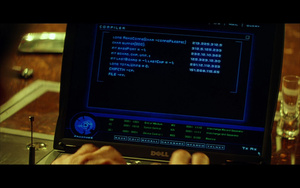Patrick Boivin is a stop-motion animation genius who does insanely amazing and expressive things with cheap action figures. I could watch Einstein kicking Vader's ass for hours.
Patrick Boivins' channel (Thanks, Fipi Lele!) ![]()
Markku.lempinenPretty cool 8)
Patrick Boivin is a stop-motion animation genius who does insanely amazing and expressive things with cheap action figures. I could watch Einstein kicking Vader's ass for hours.
Patrick Boivins' channel (Thanks, Fipi Lele!) ![]()
Markku.lempinenCool! If I had all the figures, I'd want one of these, too!
Though personally, I'd go for a Death Star throne room or a much larger Star Destroyer's bridge for obvious reasons :)
Those Indy Jones sets are damn cool, too.

Carl "Boutros77" BouMansour is a fine artist and modeller in the UK who makes elaborate diaoramas based on science fiction movies, especially Star Wars. These are lavishly documented in his Flickr sets. There's a lot to love here, but I recommend starting with the pictures of the Cantina on Tatooine. It's such an ambitious miniature set, and the attention to detail left me amazed and delighted.

Boutros77 (Thanks, Fipi Lele!) ![]()
Markku.lempinenMy biggest question so far is: why is something like dept. of Homeland Security involved in a *suspected* movie piracy?
Also also: the old-fashioned "innocent until proven guilty" clearly doesn't work in "intellectual property" cases. And that's something I find very, very offensive.
 Representatives of the MPAA and the Immigration and Customs Enforcement Agency confirmed that they worked together to yank a Google Glass wearer out of a movie theater, detain him in a small room against his will, confiscate and inspect his electronics (including his phone) and coerce an interview out of him with legal threats. They believed, incorrectly, that their victim had been recording the movie with his gadget. The Google Glass set he wore had been fitted with prescription lenses and he was watching the movie through them because they corrected his vision.
Representatives of the MPAA and the Immigration and Customs Enforcement Agency confirmed that they worked together to yank a Google Glass wearer out of a movie theater, detain him in a small room against his will, confiscate and inspect his electronics (including his phone) and coerce an interview out of him with legal threats. They believed, incorrectly, that their victim had been recording the movie with his gadget. The Google Glass set he wore had been fitted with prescription lenses and he was watching the movie through them because they corrected his vision.
The MPAA's and ICE's statements are bland and anodyne (ICE says that the interview was "voluntary," though the man's account contradicts this). Neither of them explain how it is that a movie theater employee can call an MPAA hotline, and how the MPAA can then command ICE law-enforcement officials to drop everything and rush down to a multiplex to roust a potential camcorderer and treat him like a presumptive criminal.
The problem for the MPAA of camcordering is that they would like to stagger the release of their films -- first to the theatrical exhibition channel, then to airplanes and hotel rooms, then to pay-per-view and streaming services and DVD, etc. This makes them more profitable, but only if they can keep each channel discrete. Lots of businesses struggle with their profit-maximization strategies, but only the MPAA gets to command the forces of federal law-enforcement in the service of their business-model, putting the cost of that strategy onto the tax-payer.
Even so, it seemed incredible that ICE would take direction from the MPAA on something as small as a guy in a movie theater, rushing to the theater to help with the interrogation of someone there, but we underestimated the willingness of ICE to say "how high" when the MPAA says "jump." Yes, we should know better by now, but we thought we'd actually give the MPAA and DHS the benefit of the doubt here. Our mistake.
We find it difficult to believe that there aren't more important things for ICE to be doing than hassling a guy out attending a movie with his wife. Hollywood has gotten ICE into trouble in the past with its over-aggressive claims about websites. You'd think that ICE would have learned by now that the RIAA and MPAA are not exactly trustworthy when they insist someone is a "filthy pirate" who needs to be investigated. There is simply no reason for federal investigators to be involved at all, let alone called in to interrogate some guy wearing a new piece of technology that the MPAA has overreacted to.
MPAA & ICE Confirm They Interrogated A Guy For Wearing Google Glass During A Movie [Mike Masnick/Techdirt] ![]()
Markku.lempinenSigh...
Markku.lempinenQuantum physics and a shooting game combined? Colour me curious!
Bullet hell shooters are as much about dodging as they are about shooting things. In Atomic Fusion: Particle Collider for Android and iOS, Bytesized Studios has lifted that idea of dodging waves of doom out of the bullet hell genre, given it a quantum physics themed wrapper, and optimized the controls for touchscreens. To top it off, the game is easy enough for anyone to pick up and play but also designed such that skilled players will always have more to strive for.
Quantum physics is an area about which I know little, so I can't vouch for how well the game does or does not follow scientific principles, but the player is a quantum physicist tasked with creating the elements of the periodic table by controlling an atom and absorbing plasma waves into it. Plasma waves come in matter and antimatter varieties, and since the atom being controlled can only absorb one kind at a time, the player must switch back and forth between being able to absorb the two kinds of plasma.
In a lot of ways it feels like playing Ikaruga minus the need to destroy other things. The more waves the player successfully absorbs, the closer they get to finishing the current element so they can move on to the next one. Hitting a wave of the wrong type reduces progress towards finishing the element. Getting hit by the wrong type of plasma too many times means game over.
Once a new element has been unlocked, the player can start again from that level at any time. But what happens when all of the known elements are unlocked? Well, that's where algorithms take over to make the game increasingly harder with the discovery of each new element. Starting with element 119, the first person in the world who finishes forming each element gets to name it for all other players to see, giving the best players something to strive for no matter how long they keep playing the game.
There are two control schemes besides the default which allow the player to skip the multitouch requirement to switch absorption types, but at the cost of disallowing the ability to use either hand to move. That basically means that there are two control schemes, with the non-defaults being right- and left-handed versions of the same thing. Most players will probably find the default control scheme easy and natural to use.
I see only one problem with this game, which is that its gameplay is reliant on being able to see the difference in color between blue and orange. Colorblind players may be at a disadvantage when playing because that is the only difference between the two plasma types, both for the atom and for the waves. To compound this problem, some waves change color and type, going back and forth, and the indicator is subtle even for those who can see all colors without a problem.
The game is free to download for both iOS and Android. A download gets you access to the first ten levels, after which the full game can be unlocked for $1.99. The first ten levels should be plenty to give you a good idea of whether or not you'll like the full game.
Markku.lempinenAstonishing. And not in a good way.
Despite the valiant efforts of the motley opposition in Ukraine, the tame Ukrainian Parliament has passed a brutal law that slides the country into full-on dictatorship. Forbidden under the new law on penalty of high fines and imprisonment: driving cars in columns that are more than five vehicles long; setting up an unauthorized sound system; distribution of "extremist opinion"; "mass disruptions" (10-15 years imprisonment!); collecting information on police or judges; and more.
The new law also demolishes the trappings of democracy: you can be convicted in absentia based on unsubstantiated hearsay; MPs can be arrested during plenary sessions; the state can order arbitrary Internet censorship; and legal service of documents now consists of signatures or "any other data."
(Thanks, Bob!)![]()
Markku.lempinen"Consider using the word 'candy' several times, also 'scroll', 'memory', 'saga' and 'apple' might give bonus points".
Muahaha :D
 Well, that didn't take long -- an impromptu game jam has sprung up in response to news that Candy Crush Saga creator King has had its trademark on the terms "Candy" and "Saga" approved for publication.
Well, that didn't take long -- an impromptu game jam has sprung up in response to news that Candy Crush Saga creator King has had its trademark on the terms "Candy" and "Saga" approved for publication.
The Candy Jam was thrown together by developers Caribou (@caribouloche) and T-Wave (@uuav) today because, according to the jam's Tumblr page, "trademarking common names is ridiculous and because it gives us an occasion to make another gamejam."
Developers are encouraged to submit links to their games, along with images and a description, through the Candy Jam Tumblr page before the February 3rd submissions deadline.
No word yet on how the entries will be showcased or judged, though the rules of the Candy Jam suggest that bonus points will be awarded to games that are able to incorporate notoriously trademarked terms like "saga" or "scrolls" in interesting ways.
Me & @uuav are *hosting* #candyjam if anyone is interested in making games about candies & scrolls you are welcome http://t.co/Bhq1vZTUJ5
— caribou (@caribouloche) January 21, 2014
[Alex Wawro wrote this article for sister site Gamasutra]
Markku.lempinenThat thing's much, much cooler this way!
And it reminds me of the black hole generator of Event Horizon.
 It turns out that if you remove the cowling from a CT scanner, you get something that looks like a cross between a Stargate and a whirling Katamari Damacy. It's pretty mesmerizing to watch.
It turns out that if you remove the cowling from a CT scanner, you get something that looks like a cross between a Stargate and a whirling Katamari Damacy. It's pretty mesmerizing to watch. ![]()
This post-apocalyptic shot by Clemens Kern has an atmosphere of abandonment and impending doom. Don’t forget to check out the main model.
Markku.lempinenCool! And it indeed calls for some Black Sabbath playing on the background.
Spending three months and using 3500+ tiles, this stunning 144×96 stud mosaic by Brickmoc makes me want to crank up some Black Sabbath.
Markku.lempinenI can't say I'm surprised. Companies most likely prefer 7 over 8 and 8.1 just like everyone shunned Vista for a damn good reason.
Personally, I wouldn't buy or accept an 8 either at home or at work...
 HP, the world's second largest PC maker, has begun emailing customers that "Windows 7 is back" as an option for those looking to buy new PCs.
HP, the world's second largest PC maker, has begun emailing customers that "Windows 7 is back" as an option for those looking to buy new PCs.
"Windows 7 – back by popular demand!" pic.twitter.com/tANB7joTGJ (via @jackbrewster)
-- Cabel (@cabel) January 19, 2014
Markku.lempinenThis nonsense brightened my day and gave me a distraction from work: I had to clean up the coffee from my screen :p
Buahahaha!

A city councillor from Britain's right-wing UKIP says that recent rough weather is divine retribution for the legalization of gay marriage.
"The scriptures make it abundantly clear that a Christian nation that abandons its faith and acts contrary to the Gospel (and in naked breach of a coronation oath) will be beset by natural disasters such as storms, disease, pestilence and war," wrote David Silvester to his local newspaper, the Henley Standard. "I wrote to David Cameron in April 2012 to warn him that disasters would accompany the passage of his same-sex marriage bill."
He assailed the Prime Minister David Cameron for his arrogance "against the Gospel" and said "It is his fault that large swathes of the nation have been afflicted by storms and floods."
An unusual shot of old-timey religion in the arse of Britain's smarmy, well-groomed political scene, Silverster was initially supported by his party. After news reports appeared, however, he was suspended by the UKIP, which released a statement condemning his remarks.
“We cannot have any individual using the Ukip banner to promote their controversial personal beliefs which are not shared by the party,” said Roger Bird, the party's regional chairman.
Nigel Farage, leader of the UKIP, said he was working to remove anyone with “extremist, nasty or barmy views” from the party. "Of all the candidates we fielded, only about half a dozen have caused us any embarrassment," he told The Sun newspaper.
Farage later added, however, that the sudden row over Silvester's longstanding beliefs proves that the mainstream political parties are "scared witless" of UKIP's message.
"I think it is very interesting that, when Mr Silvester was saying these things in 2012 and 2013 as a Conservative town councillor in Henley, it was not a news story," he was quoted as saying in a Press Association report.
Many UKIP members are former Conservatives unhappy with that party's centrist and authoritarian leanings, in particular its assent to gay marriage and its hesitant opposition to immigration and continuned European Union membership. Though the uneasy marriage of libertarianism and right-wing traditionalism appears to be running out of steam in America, Britons are fresh to it and remain bemused: the UKIP, despite having no members of parliament, was yesterday voted Britain's "favorite" political party.![]()
Markku.lempinenWhat a surprise! Nothing's going to change for real! :O
Can I pretend to be shocked? No, not really.

Earlier this week, EFF published a scorecard for rating Obama's NSA reforms. Now that the reforms have been announced, it's time to measure them up. They don't fare well, I'm afraid. Here's a roundup of commentary from privacy leaders around the world, expressing disappointment (if not surprise) at Obama's half-hearted reining in of the surveillance state.
3. No data retention mandate.Score: 0
Obama’s review group recommended that the telephone metadata surveillance program be taken away from the government, suggesting that a third party or even telecom companies themselves be responsible for maintaining a searchable list of our calling records. This approach—mandating companies act as Big Brother’s little helper—won’t alleviate the serious privacy concerns with maintaining a digital record of every call we make. We had hoped that Obama would make clear that he would reject any form of mandatory data retention. Instead, Obama acknowledged some of the concerns with a data retention mandate but called for “options for a new approach that can match the capabilities and fill the gaps that the Section 215 program was designed to address, without the government holding this metadata itself.” He never specifically rejected the idea of forcing companies or a third party to hold this data, and so he does not receive a point in this category.
...
5. Stop undermining Internet security.
Score: 0
The NSA’s systematic efforts to weaken and sabotage the encryption and security technology make us all less safe. But in contrast to his review group’s recommendations to stop those practices, Obama was silent on the issue. That silence is disappointing, as this is a critical problem that has not just undermined the privacy of millions around the world, but poisoned our collective trust in institutions that depend most on it. Zero points.
Rating Obama’s NSA Reform Plan: EFF Scorecard Explained ![]()
Markku.lempinenCool!
It's just missing the TIE/A proto and it's two TIE/ln wingmen.
It’s not the first time we’ve blogged a WALL-E, and it probably won’t be our last either. After a slight diversion with BURN-E in Nov, the movie’s adorable main character is back this week as three different builders given us their take on this little fella:
First up, is the largest from David Hensel (Legonardo Davidy):
Evan (Lego Junkie) chimes in with his mini version:
And finally the one that started this week’s WALL-E bandwagon, Tyler (Legohaulic) gives us his rendition:
And a bonus link – Evan also has a fun Microbe Obliterator; M-O to clean up after his WALL-E.
Markku.lempinenTSA has fucked up yet again :D
 Despite a series of disgraceful dirty tricks, the TSA has lost its case against Dr Rahinah Ibrahim, a Malaysian academic who had been wrongly put on the no-fly list. The DHS engaged in witness tampering (denying Dr Ibrahim and her witnesses access to the courtroom by putting them on the no-fly list) and argued that neither Dr Ibrahim nor her lawyers should be allowed to see the evidence against her (because terrorism).
Despite a series of disgraceful dirty tricks, the TSA has lost its case against Dr Rahinah Ibrahim, a Malaysian academic who had been wrongly put on the no-fly list. The DHS engaged in witness tampering (denying Dr Ibrahim and her witnesses access to the courtroom by putting them on the no-fly list) and argued that neither Dr Ibrahim nor her lawyers should be allowed to see the evidence against her (because terrorism).
Lowering the Bar does a great job of summing up the ruling, which held the no-fly list unconstitutional because citizens are "entitled to a remedy that requires the government to correct its lists and records... and to certify under oath that such correction(s) have been made."
* The plaintiff has standing to challenge the no-fly listing and practices, and all of the government's arguments to the contrary are overruled.
* Once a plaintiff shows "concrete, reviewable adverse government action" (i.e. not being allowed to fly) has resulted from a government error, she is entitled to a remedy that requires the government to correct its lists and records "and to certify under oath that such correction(s) have been made."
* Because the government's current administrative remedies, such as they are, don't do this, they are unconstitutional.
* He ordered the government to provide that remedy here (take plaintiff off the list and certify under oath that it did so), and/or to disclose whether she is in fact on or off the list. (As you may recall, the government refuses to tell people whether they are on the list or not.)
* Presumably she is or will soon be off it, because "the government concedes [as it has for a while now] that plaintiff is not a threat to our national security."
Judge Rules for Plaintiff in No-Fly Case
(Image: University Putra Malaysia) ![]()
Markku.lempinenAwesome :D
The sets are sold out, unfortunately, but you can still buy favorite elements individually. [via JWZ] ![]()
Markku.lempinen"RIAA is calling for voluntary anti-piracy ‘best practices’ to deal with the problem at hand. [...]
To make facilitate such an agreement, the music group has drafted a [...] five-point plan for Google and other search engines to fight piracy."
Heh. They call for a voluntary this and that, then they proceed by giving an "obey me" -list. If that didn't sound so damn stupid, it'd be kinda funny.
Personally, I'd be fucking offended by that, but I'm not operating a search engine, so I can declare whatever I want without any pressure from these groups.
 The music industry is not pleased with Google’s approach to their piracy problem. While the search engine rapidly removes millions of links week after week, the RIAA and IFPI want Google to be more proactive.
The music industry is not pleased with Google’s approach to their piracy problem. While the search engine rapidly removes millions of links week after week, the RIAA and IFPI want Google to be more proactive.
The music groups sent their 100 millionth takedown request to the search giant this week, and used this dubious milestone to lay out their demands to Google once more. According to the RIAA’s Cary Sherman, Google must have a way to better deal with piracy.
“Surely there must be a better way for users to be directed to legitimate sources of the music they seek instead of illegal ones,” Sherman notes.
The RIAA points out that Google has taken some steps to address the piracy issue, such as the promise to give “pirate” sites a lower ranking in their search results. However, the music group believes that this strategy has failed thus far.
“We’ve seen no demonstrable demotion of sites that receive a high volume of piracy notices,” Sherman writes.
“In fact, when a user searches for virtually any prominent artist and song and ‘mp3,’ the first result served up by Google’s own auto-complete function is usually mp3skull.com — a site that’s received more than two million music piracy notices and is among the top offenders on Google’s own public listing of sites receiving the most piracy notices,” he adds.
The RIAA previously found that for 98% of the music related searches they performed, “pirate sites” were listed on the first page of the search results. According to the music group, this is an indication that more proactive measures are required, in the interests of both Google and the labels.
“So the enforcement system we operate under requires us to send a staggering number of piracy notices – 100 million and counting to Google alone—and an equally staggering number of takedowns Google must process. And yet pirated copies continue to proliferate and users are bombarded with search results to illegal sources over legal sources for the music they love,” Sherman notes.
Together with IFPI, who released a press release on the same topic yesterday, RIAA is calling for voluntary anti-piracy ‘best practices’ to deal with the problem at hand. The groups note that payment providers and advertisers previously agreed on similar policies in a bid to help copyright holders.
To make facilitate such an agreement, the music group has drafted a “simple, straightforward and readily achievable” five-point plan for Google and other search engines to fight piracy. Their suggestions are as follows.
1. Fulfill the admirable promise to demote sites receiving extensive numbers of piracy notices
2. Make sure that the “take down” of a song is meaningful – not repopulated online two seconds later
3. Educate users by identifying authorized sites with a consumer-friendly “icon”
4. Stop leading users to illegal sites through autocomplete
5. Give your repeat offender policies some teeth
Looking at the list we see that Google has already started on point 1 and 4, but not to the satisfaction of the music groups. Point 2 is interesting as it suggests some form of hash blocking to ensure that content is not re-indexed, for as far as that is possible for search results.
Point 5, regarding “repeat offender” policies, is most vague. It seems to suggest that the RIAA and IFPI want Google to take action against sites that repeatedly receive takedown notices, but that would be the same as point 1.
This is not the first time that copyright holders have shared their anti-piracy wish lists with Google. In 2012 a behind-closed-doors meeting revealed that the copyright industry wanted the search engine to implement several anti-piracy measures.
Whether Google intends to take up the new five-point plan remains to be seen. One thing’s for certain though – pressure from the RIAA and other anti-piracy groups will only increase during the coming years.
Source: TorrentFreak, for the latest info on copyright, file-sharing and VPN services.
Markku.lempinenI'm not a leather-jacket person... but just look at it! Classic space Lego! The stuff of childhood :D
 Our friends at Evil Mad Scientist Laboratories painted a leather bomber jacket with the 1970s and 80s “Classic Lego Space” logo. They included step-by-step instructions for painting your own. It involves stripping the shiny stuff off the leather and using special acrylic leather paint.
Our friends at Evil Mad Scientist Laboratories painted a leather bomber jacket with the 1970s and 80s “Classic Lego Space” logo. They included step-by-step instructions for painting your own. It involves stripping the shiny stuff off the leather and using special acrylic leather paint.

I like the design of Angelus' products. I want to buy them to place on my curio shelf.
The Classic Lego Space Flight Jacket![]()
Markku.lempinenInteresting and amusing :D
 A blog that displays and details source code shown on screen in TV Shows and movies is gaining considerable attention.
A blog that displays and details source code shown on screen in TV Shows and movies is gaining considerable attention.Markku.lempinenThere's a good (mountain-sized to be fair) pile of EU that I'd be most glad to be rid of. But there's also a bit that I'd love to keep canon.
Unsurprisingly, I guess, I'd keep Thrawn's original trilogy and maybe even the Hand of Thrawn duology, even though it wasn't as awesome as the Thrawn Trilogy. Nothing could be as awesome.
Getting rid of everything by Anderson, McIntyre and Hambly for example, would be a vast improvement in my opinion ;)
Star Wars is sacred to geeks. Characters in Kevin Smith movies refer to it as "the Holy Trilogy," and for almost as long as Star Wars has existed, fans have wanted to know more about the universe outside of the movies—and the canonicity of all the elements of that universe is the subject of almost ecclesiastical-scale debates. The movies are unquestionably official—they are the foundational elements of Star Wars, even Episodes I-III. However, the combined mass of video games, board games, tie-in novels, cartoons, and anything else branded with a Star Wars logo occupies a lesser tier in the hierarchy: all these things are still "official" in that they carry the logo, but they are merely part of the Star Wars Expanded Universe.
The Expanded Universe—the "EU"—sprawls like a bloated dead thing with tentacles stretching in all directions. Everything is in there: Timothy Zahn's Thrawn series (which introduced the eponymous Admiral Thrawn, as well as fan favorite Mara Jade, the former Emperor's Hand-turned-smuggler who overcame her hatred of Luke Skywalker and became his wife). Clone Wars and The Old Republic. The Yuuzhan Vong and the death of Chewbacca. Kevin J. Anderson and all the unspeakably, unreadably bad literary atrocities for which he's responsible.
A sci-fi universe with as long a tail as Star Wars can be death for new stories, though. Finding space among the EU to make a mark without being hamstrung by established ideas is difficult, and even keeping the EU somewhat organized is challenging. Its growth has been cancerous—like a tumor, it has no plan and no organization—it simply expands, blindly, as the collective fan engine shovels in new material.
Markku.lempinenThis is fucking scary news again.
 The Motion Picture Association of America (MPAA) has joined the World Wide Web Consortium (W3C), it has been announced.
The Motion Picture Association of America (MPAA) has joined the World Wide Web Consortium (W3C), it has been announced.Markku.lempinenI really like the damage on this build!
OK, so I have almost completed it.
I only have weathered one side, the most damaged one....added the decals, and finished the burned cooked off effect, melted tired and damged tracks.
This SDKFZ will be used in a diorama.
My intention is that is well damaged, abandoned vehicle left to its luck.
What do you think?
Markku.lempinenSounds amusing and interesting. Either you can get a "normal" station or the Citadel. Or something in between.
Angry Engineers Entertainment is working on their first big project together, Centration. They're aiming high, too, trying to create a game in which players inhabit space station environments that are highly interactive but also require player management and fixing to remain safe for humans to live in. They want to top that off by making it multiplayer, both on their servers and on private ones, and giving players the means to use the environment against each other if they so desire. If you've ever fantasized about playing a part in a sci-fi epic set in deep space, it's worth hearing what the devs have to say.
Centration is currently in alpha, and Angry Engineers is running an Indiegogo campaign to raise funds for continuing development of the project in addition to taking pre-orders on their own site. Their Indiegogo pitch is not the most clearly written, but Angry Engineers co-owner Aaron Challis has answered some questions for us that shed some light on the direction they plan to take the game.
Your Indiegogo pitch calls Centration a first-person survival horror sandbox, but it also talks about rounds/shifts and missions. When I think of a survival sandbox, I don't think of time limits on gameplay. Can you tell me how a round of play goes, exactly, and what goes into it?
We call it a sandbox survival game because it's essentially surviving on board in a space station with simulated airflow, electricity, and realistic behaviours for everything. There are no gameplay limitations, only nudges and guidance. A round or "shift" in Centration essentially consists of three main parts, which are only guidelines to enjoy the round mode or plot. However, players can opt to play a no-plot round.
[In] the beginning, everyone settles down and figures out who's who and what their role is in all this madness. Then there's the middle, which is where the protagonist (whomever that may be; it could be a gameplay chosen protagonist or it could be just some player who's decided to do something crazy/stupid) makes himself, his intentions, or the fact that he exists known. The end of the round is usually the most chaotic -- many parts of the space station at this point are destroyed, damaged, or otherwise not working. A lot of the players have probably already died off or are hiding or off doing their own devious things, and the protagonist is usually coming to the culmination of his or her plans. That's the basics behind how a shift works in Centration. However, in the future we plan on expanding the concept into an MMO-style persistent sandbox environment.
You plan to have character leveling in the game, which implies some sort of experience point/skill up system, but what about playing successive rounds with the same people? Will players be able to set up a sort of campaign-style game with multiple rounds?
As I briefly mentioned previously, we actually plan in the future to expand the concept of Centration into an MMO-style persistent environment. This will take the shift-based system and replace it with a persistent gameplay type, where players will train and acquire skills over various sessions working for the same crew. We plan on making each "space station" (or server in real world terms) interact with each other with the ability to send players for visits (or raids), trade, and participation in a global player-controlled economy by producing, consuming, and gathering materials.
Your pitch talks about rounds lasting anywhere from 5 minutes to several hours. Will players be able to set a time limit if they wish?
Every server can set a time limit for the game, which dictates when the player's "shift" ends and the round is over. This is recommended but not a requirement, as server hosts can opt to just let the games play out until everyone is dead or the protagonist gets his wicked way.
Will there be a single player mode at all?
Centration is primarily an online-multiplayer game, [though] we do not plan on including any type of forced DRM. The only requirement is that they at least once authenticate with their accounts to prove their ownership of the game, after which they are more than welcome to stay offline and play LAN-games until the world ends. There will be offline-training and a 'sandbox' gameplay mode at release, and in the future we do plan on introducing some story-driven single-player/coop campaign episodes.
It sounds like you plan on having a very interactive environment. Will players be able to sabotage the station?
Yes, almost every part of the environment will be interactive in some way, you can pull up the floor tiles, rip the walls apart, destroy entire sections and even repair and rebuild them. Home-made bombs, traps, and sabotage are all a core requirement!
If everything is potentially a weapon, how do you intend to make them more than just bludgeons and projectiles?
The ability to combine items in certain creative ways, with constant updates and content additions... by release we intend to have well over a few hundred thousand ways to kill someone. There's the obvious bludgeoning with objects, then you can get a little bit creative by attaching, say, a shoe to the end of a pipe for that extra bit of reach and humour. Moving on from boring blunt-force trauma, however, the environment is your weapon. Reprogram airlocks to open and decompress once your target goes near them, pump poison gas into your co-worker's science lab, hook up a pressure-plate under a floor tile with an air-horn (or bomb, that works too)... the possibilities will only grow with our community's demands and wishes.
Part of the Centration pitch calls it a psychological game. Will the psychological effects come mostly from the environment or mostly from player interactions?
Both, almost equally. The environment is naturally a big psychological factor here. You're in space, surrounded by cold nothingness that'll kill you within 2 minutes and severely injure you within seconds. Things will break, things will explode, and there's almost nothing you can do to prevent that from happening at times. That's a big psychological weight. Interacting with other players could have the usual enraging effects that most online multiplayer interactions do, but with the environment in question, the gameplay, and all of the other players that could be out to get you, your mind will start to play tricks on you... was that a shadow around that corner? Who made that noise? Why does she have that bone-saw?
It sounds like the game has the potential for people to troll, since you give players the choice of doing their assigned jobs seriously or goofing off. Would you consider that a feature or a potential issue?
It's a feature. We want to give the players and servers a full compliment of tools to be as serious or as relaxed as they wish. If a server wants to go in for the hardcore role-playing, they've got the tools to enforce that, but at the same time, other servers can just let everyone join in and have as much crazy destructive fun as they want. That, along with an online black-flag list where server hosts can choose to flag potential players [for] other players [to] vote on [that] servers can choose to use or ignore, means that the community will be able to (with guidance) police their trolls.
What games or other media besides Space Station 13 have influenced the design of Centration?
When designing Centration, I was very big into sci-fi. I read books such as Ender's Game, watched movies like Star-Trek, Star-Wars, all the usual sci-fi fan fare. Big inspirations that go into our design include Stargate SG-1/Atlantis, Ender's Game, I, Robot, Blade Runner, and the Fifth Element. A lot of the environments, military structuring, social-equality and corporate global ownerships in those back stories played quite a large part of the design process.
What games would you compare Centration to and how is it different from them?
The closest games we could think of would be Space Engineers and Space Station 13. We differ from the former in that we're taking a more immersive approach to the social constructs of crewing a space station and the potentially destructive results that could yield, and Centration differs from the latter by taking a much more realistic, grime-grunge approach to the look and feel, along with expressing what I had hoped Space Station 13 could turn into at some point.
 Desirina Boskovich writes, "It Came From the North, my brand new e-anthology of Finnish speculative fiction, is now available from Cheeky Frawg Books. Cheeky Frawg, a small press run by Ann and Jeff VanderMeer, is carving out a big name for itself as a quality purveyor of weird fiction and speculative literature in translation, with recent titles including the widely-praised Jagganath by Karin Tidbeck and very well-received Datura by Leena Krohn."
Desirina Boskovich writes, "It Came From the North, my brand new e-anthology of Finnish speculative fiction, is now available from Cheeky Frawg Books. Cheeky Frawg, a small press run by Ann and Jeff VanderMeer, is carving out a big name for itself as a quality purveyor of weird fiction and speculative literature in translation, with recent titles including the widely-praised Jagganath by Karin Tidbeck and very well-received Datura by Leena Krohn."
With contributors such as Johanna Sinisalo, Leena Krohn, Hannu Rajaniemi, Jyrki Vainonen, and Pasi Ilmari Jääskeläinen, It Came From the North features fifteen odd and lovely stories ranging from the downright fantastical to the merely uncanny. The gorgeous cover art is by Jeremy Zerfoss, illustrator extraordinaire. Available as an ebook only.
Desirina is a great writer in her own right (see Deus Ex Arca), and an incisive critic (she was one of my most promising Clarion students out of a very good class indeed), and I'm very excited indeed to see her editorial debut.
It Came From the North [Amazon]
Table of Contents + Cover: IT CAME FROM THE NORTH: AN ANTHOLOGY OF FINNISH SPECULATIVE FICTION Edited by Desirina Boskovich [SFsignal.com] ![]()
 Well, that didn't take long: shortly after Google added a new Android feature that let you deny apps access to your sensitive personal data, they have revoked it. This is frankly terrible, and the Electronic Frontier Foundation's Peter Eckersley has some very pointed commentary, recommendations for Android customers, and advice for Google:
Well, that didn't take long: shortly after Google added a new Android feature that let you deny apps access to your sensitive personal data, they have revoked it. This is frankly terrible, and the Electronic Frontier Foundation's Peter Eckersley has some very pointed commentary, recommendations for Android customers, and advice for Google:
A moment ago, it looked as though Google cared about this massive privacy problem. Now we have our doubts. The only way to dispel them, frankly, is for Google to urgently reenable the App Ops interface, as well as adding some polish and completing the fundamental pieces that it is missing:
* Android users should be able to disable all collection of trackable identifiers by an app with a single switch, including data like phone numbers, IMEIs, information about the user's accounts.
* There should be a way to disable an app's network access entirely. It is clear that a large fraction of apps (including flashlights, wallpapers, UI skins, many games) simply don't need network access and, as we saw last week, are prone to abuse it.
* The App Ops interface needs to be smoothed out an properly integrated into the main OS user interface, including the Settings->Apps menus and the Play Store. There are numerous ways to make App Ops work for developers. Pick one, and deploy it.
In the mean time, we're not sure what to say to Android users. If app privacy is especially important to you — if, for instance, you want to be able to install an app like Shazam or Skype or Brightest Flashlight without giving it permission to know your location — we would have to advise you not to accept the update to 4.4.2. But this is also a catastrophic situation, because the update to Android 4.4.2 contains fixes to security and denial-of-service bugs. So, for the time being, users will need to chose between either privacy or security on the Android devices, but not both.
Google, the right thing to do here is obvious.
Google Removes Vital Privacy Feature From Android, Claiming Its Release Was Accidental ![]()
Markku.lempinenI'm going to need to update my OS anyway and the dualboot setup has been idle for as long as I've had this compy. Because I'm so damn lazy.
So whenever I get to do some serious updating, this'll be under consideration (though I don't think my 3+ years old motherboard has even heard of UEFI (which is also not a bad thing)).
True to its word, Valve has released a beta version of SteamOS, the Linux-based operating system that it will use to power its living room Steam Machine consoles. The release coincides with a lucky group of 300 public beta testers who were selected to actually receive Steam Machines to test on—the rest of us can still use the OS, but we'll have to bring our own hardware.
Valve had previously recommended that users who aren't "intrepid Linux hackers" should wait a few more months before trying out SteamOS, but that's not going to stop Ars from barreling head first into the midst of things! We downloaded the OS as quickly as we could after it went live and spent some time getting it whipped into shape on fresh hardware. Contrary to Valve's warning, the install wasn't complex or scary at all—though if you've never installed Linux before, it might take you a bit out of your comfort zone.
| Specs at a glance: The Ars Technica Steam Machine | |
|---|---|
| CPU | Intel Pentium G3220 (Haswell), dual-core, 3.0 GHz |
| GPU | Zotac Geforce GTX660 (2GB) |
| RAM | 8 GB DDR3-1600 |
| Motherboard | MSI H81I (mini-ITX) |
| Storage | Western Digital WD Blue 7200 rpm 500GB HD |
| Sound | Onboard |
| Network | Onboard (wired gigabit Ethernet) |
| PSU | Antec VP-450, 450W |
| Case | BitFenix Prodigy, arctic white |
Since we didn't receive a Steam Machine to test, we set out to build our own. Our goals were to stick to known-good SteamOS hardware, and to keep the price between $5-600. Andrew Cunningham, Kyle Orland, and I all stuck our heads together and came up with the configuration at right. All items were purchased from NewEgg, and the total prior to shipping was $562.93.
Read 35 remaining paragraphs | Comments
Markku.lempinen"the copyright violation flags seem to come from third parties that don't own the rights to the game in question"
What a fucking surprise...
Several big names on YouTube were barraged with copyright violation notices this week that could potentially be erroneous. In the past, ContentID, YouTube's automated copyright violation checker, has overreached in flagging game-related content (in May, for example, when “Let's Play” videos were cited for including some of Nintendo's content). But this time, the flagging seems to be related to new rules from YouTube about how video makers who are part of Multi-Channel Networks (MCNs) upload their videos.
According to TubeFilter, YouTube told these MCNs last week that it would begin pre-screening a sample of their affiliates' videos for copyright violation before the video posts to YouTube in a process that could take as little as a few hours or up to a few days. The pre-screening system is also based on good behavior, so to speak, and affiliates who are never caught uploading copyrighted material will be checked less frequently.
That system seems to be causing some problems now, as popular YouTube channels are seeing a spike in copyright violation notices, which caused YouTube to remove ads from the video but not to necessarily take it down. For many very popular channels, this means a significant loss of revenue.
Read 4 remaining paragraphs | Comments
Markku.lempinen*installing* :)
 Android privacy just got a lot better. The 4.3 version of Google's mobile operating system now has hooks that allow you to override the permissions requested by the apps you install. So if you download a flashlight app that wants to harvest your location and phone ID, you can install it, and then use an app like AppOps Launcher to tell Android to withhold the information.
Android privacy just got a lot better. The 4.3 version of Google's mobile operating system now has hooks that allow you to override the permissions requested by the apps you install. So if you download a flashlight app that wants to harvest your location and phone ID, you can install it, and then use an app like AppOps Launcher to tell Android to withhold the information.
Peter Ecklersley, a staff technologist at the Electronic Frontier Foundation, has written up a good explanation of how this works, and he attributes the decision to competitive pressure from Ios, which allows users to deny location data to apps, even if they "require" it during the installation process.
I think that's right, but not the whole story: Android has also always labored under competitive pressure from its free/open forks, like Cyanogenmod. In the days when Android didn't allow tethering (as a sop to the mobile carriers, who are the gatekeepers to new phones for many people), Cyanogenmod signed up large numbers of users, simply by adding this functionality. Google added tethering to Android within a couple of versions. Some versions of Cyanogenmod have had the option tell your phone to lie to apps about its identity, location, and other sensitive information -- a way to get around the "all or nothing" installation process whereby your the apps you install non-negotiably demand your "permission" to plunder this information. I'm not surprised to see the same feature moving into the main branch of Android.
This dynamic is fascinating to me: Google has to balance all kinds of priorities in rolling out features and "anti-features" (no tethering, non-negotiable permissions) in Android, in order to please customers, carriers and developers. Free/open forks like Cyanogenmod really only need to please themselves and their users, and don't have to worry so much about these other pressures (though now that Cyanogenmod is a commercial operation, they'll probably need to start playing nice with carriers). But because Android competes with Cyanogenmod and the other open versions, Google can't afford to ignore the featureset that makes them better than the official version. It's a unique, and extremely beneficial outflow of the hybrid free/commercial Android ecosystem.
In the early days, that model was at an improvement on its major competitor, Apple's iOS, which didn't even have a permissions model. But after various privacy scandals, Apple started forcing apps to ask for permission to collect data: first location and then other categories, like address books and photos. So for the past two years, the iPhone's app privacy options have been miles ahead of Android's.
This changed with the release of Android 4.3, which added awesome new OS features to enhance privacy protection. You can unlock this functionality by installing a tool like App Ops Launcher. When you run it, you can easily control most of the privacy-threatening permissions your apps have tried to obtain. Want to install Shazam without having it track your location? Easy. Want to install SideCar without letting it read your address book? Done.2
Despite being overdue and not quite complete, App Ops Launcher is a huge advance in Android privacy. Its availability means Android 4.3+ a necessity for anyone who wants to use the OS while limiting how intrusive those apps can be. The Android team at Google deserves praise for giving users more control of the data that others can snatch from their pockets.
Awesome Privacy Tools in Android 4.3+ ![]()